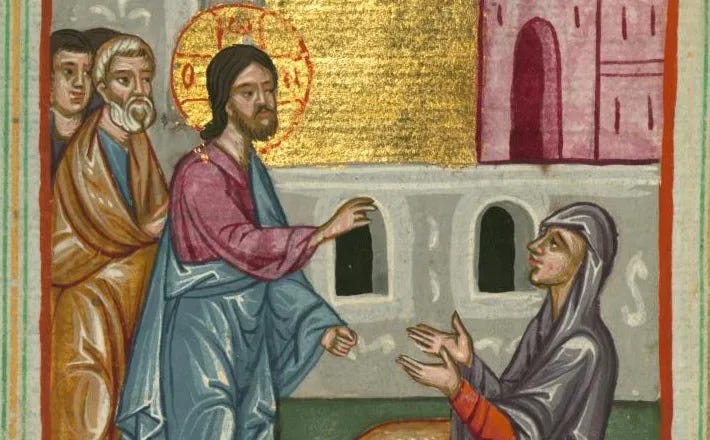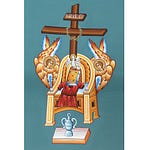[Note: the audio recording above will vary in places from the prepared text below.]
It is a common approach to preaching to begin the sermon with a joke. Share something of humor, the thinking goes, to break down the wall between preacher and listeners. And there is biblical precedence for doing so. Saint Peter, in really what is the first Christian sermon, on the Day of Pentecost, the coming of the Holy Ghost to the 120 apostles and all Jerusalem, apparently fairly early in the day, got up, grabbed the mic, and in response to criticisms he heard from the crowd, that the disciples, apparently having become full of the Holy Spirit, seem full of something else, namely new wine, responded to the crowd by saying, “Men of Judea and all who dwell in Jerusalem, let this be known to you, and give ear to my words. For these men are not drunk, as you suppose, since it is only the third hour of the day – meaning it was nine o’clock in the morning – they are not drunk, he said, because it is only 9 am. “But give them some time,” he seemed to be saying by way of a joke, “perhaps by 3 this afternoon, you may have a point!” he seemed to say.
Well, I do not have a joke like that. But I am going to begin my preaching with something that is a joke. But I mean “joke” in a different sense, the sense of “that is pathetic, that is a joke.” And what this joke is has to do with our Gospel passage. I mentioned several Sundays ago that when preaching on the Parable of the Wheat and the Weeds that there are weed parishes within the Anglican communion, and we are, if you talk our Lord’s parable in this way and His teaching seriously, to not try to pull up any weeds, but to leave that to the angels at the end of days. This I bring up because there is a way of interpreting today’s Gospel passage about the Canaanite woman that holds this moment captured by both Saint Matthew and Saint Mark whereby Jesus is sexist and prejudiced against non Jews and is taught by the Canaanite woman to be more inclusive in his thinking, more equitable towards women, and less prejudiced against foreigners.
To call that sort of interpretation a joke is in fact being quite charitable. To be clear, that interpretation is wrong, and it is so wrong as to be heretical; that is, it reflects heresy. Calling Jesus a big fan of the Chicago Bears is wrong because everyone knows Jesus roots for the Green Bay Packers; but that is just wrong, not heresy. Saying Jesus, Our Lord, Our Saviour, the Eternal Word of the Father, Who sits at the Right Hand of God someone who needed to be taught not to be sexist, not to be prejudiced, even not to be racist, is heresy, in no uncertain terms. Christ is fully God, fully man; like us in His humanity in all ways save for sin, and through Him all things are made. So, something else entirely is going on than such a heretical, pathetic interpretation would imply.
What is going on, then? It is that Jesus is using this encounter with a gentile woman to reveal to His disciples about the universality of the Gospel. Jewish tradition held that Israel was God’s chosen people, which is true. Yet while Israel was God’s chosen people, part of their being chosen is that through Israel the Savior, the Christ would be revealed. This Christ, Jesus, would be the glory of God’s people Israel, but also the Light to lighten the Gentiles.
How does this work, in our Gospel passage? Notice the faith on the part of the Canaanite woman: she said, “Have mercy of me, O Lord, Son of David.” That is quite a confession of belief in who Jesus is. Jesus acknowledged how extraordinary her faith was: “O woman, great is your faith!” What then with the ways Jesus spoke to her? Jesus saw a teaching moment, to teach his disciples, who wanted Jesus to send her away. Why would then want her to do so? Because their view that only the children of Israel would enjoy the fruits of the Messiah, and that the Messiah would not be a spiritual savior but a military savior. When Jesus says, “I was sent only to the lost sheep of Israel,” He is parroting back to His disciples their view of the Messiah, their inaccurate view of being a military savior. Jesus continues to see the simple faith of the Canaanite woman, undeterred, for she says, “Lord, help me.” Again, such great faith! And our Lord’s response is of the same variety as His previous statement: “It is not fair to take the children’s bread and throw it to the dogs,” again, not the view of Jesus, but in effect the view of the children of Israel, and probably lingering at least in the minds of the disciples.
All throughout this encounter, Jesus wanted to celebrate faith in Him as a Savior of souls. And He wants our faith in Him to be clear, to be strong, to be solid, and to be simple. And so let us be inspired by the Canaanite woman and her faith. Let us say with her “Have mercy on me,” which is a form of the Jesus Prayer of the Heart: “Lord Jesus Christ, Son of God, have mercy on me.” Let us ask Our Lord for His help, which is the same as His mercy. Let us be persistent even if those around us mock us for our simple, solid, strong, and clear faith in Christ. And let us always know, and always remember, that Jesus is the same Lord Whose property is always to have mercy. And ask Him to give what He most earnestly desires to share: Himself. Amen.











Share this post